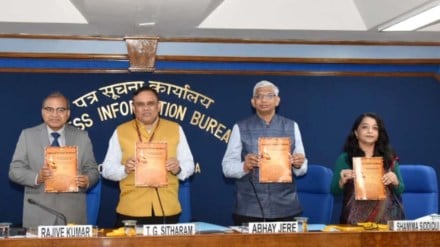Chairman of the All India Council for Technical Education (AICTE), T.G. Sitharam, alongside vice chairman Abhay Jere and member secretary Rajive Kumar, officially launched the AICTE Approval Process Handbook for the Academic Years 2024-2027 today at the PIB Conference Hall in Shastri Bhawan, New Delhi, according to an official release.
AICTE has introduced an Approval Process Handbook applicable for the upcoming three years. This comprehensive guide outlines the procedures that educational institutions must adhere to when seeking approval from the council to conduct technical and management programmes/courses. Sitharam underscored the amendments and provisions incorporated in this year’s Approval Process Handbook, with a primary focus on enhancing the quality of education, streamlining procedures and ensuring transparency in implementation, the release mentioned.
Notably, AICTE took a novel approach by sharing the draft of the new handbook in the public domain for the first time, inviting opinions, suggestions and feedback from various stakeholders and experts. The initiative garnered more than 600 suggestions and comments from diverse stakeholders, all of which were meticulously evaluated by an expert committee. Many of these suggestions were subsequently integrated into the final draft of the Approval Process Handbook, as per the release.
The recent amendments to the APH include several noteworthy changes. Well-performing institutions now have the option to extend their approval period to a maximum of three years. The upper limit on course/programme intake for such institutions has been eased, contingent upon demonstrating quality infrastructure and qualified faculty. Compliance requirements related to land documents and NOC from affiliating authorities have been reduced. Notably, well-performing existing institutions within affiliating university jurisdictions can now establish off-campus facilities, the release noted.
Furthermore, AICTE has expanded its oversight to include undergraduate programmes in Computer Applications and Management, ensuring coordinated development in technical and management education. Working professionals can now upgrade their academic qualifications and skill sets through flexible timing options.
Institutions seeking upgrades or renovations can utilise the hibernation provision. The approval process for Open and Distance Learning/Online Learning has been clarified. All AICTE-approved institutions have default approval for skilling through vocational courses. Revised penal action clauses are in place for violations. The emphasis on innovation is evident through the INDOVATION programme and the establishment of Institution’s Innovation Council (IIC) on campuses, it added.
The recent inclusion of AICTE approval for institutions offering BCA and BBA/BMS courses is poised to enhance educational quality by implementing a model curriculum. This accreditation not only ensures eligibility for scholarship programmes such as PRAGATI, SAKSHAM, SWANATH, etc., but also facilitates faculty participation in FDPs through ATAL Academy. Additionally, it opens avenues for the Quality Improvement Programme, Research Promotion Scheme for faculty funding, and Innovation Cell activities for students, as per the release.
Additionally, AICTE’s initiative grants students free access to all technical books, entry to the Students Assessment Portal (PARAKH) and facilitates placement and internship opportunities through AICTE’s Internship and Placement portal. In its commitment to fostering holistic, qualitative, inclusive and accessible education, AICTE aims to position India as a technical hub by 2047. Acting as a mentor, facilitator, and enabler, AICTE caters to the diverse needs of its stakeholders, it noted.
